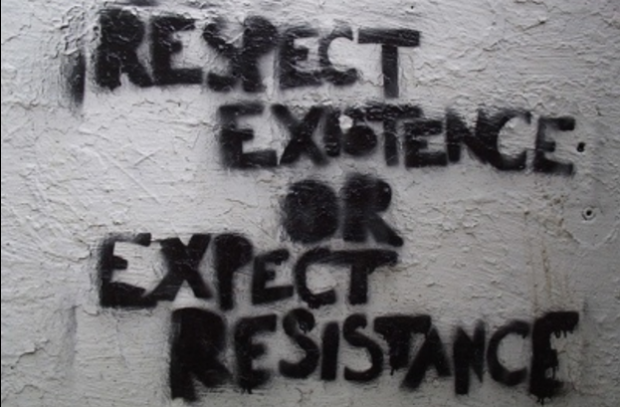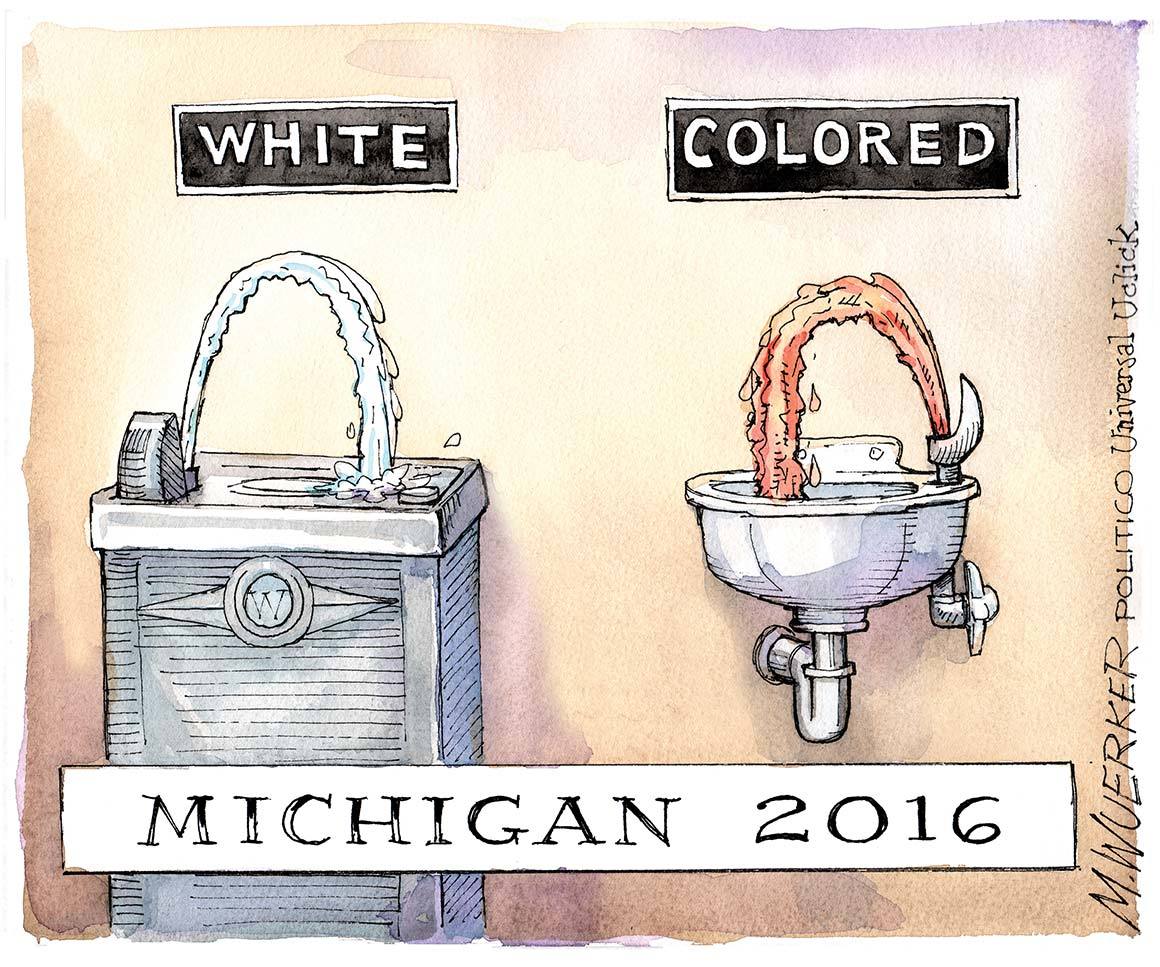
The violation of human rights in Michigan has been going on for decades – the inevitable result of maintenance deferred in a strained economy. The canaries have been singing for awhile with emergency management, crumbling infrastructure, job loss, poverty, failing education, and so on. But since the bottom keeps falling, it seems we haven’t hit it yet. As with other social movements, mere mistreatment isn’t enough to provoke true change.
It takes something truly egregious to catalyze action. It takes a Flint to start a fire.
The Straw That Broke
When Occupy Wall Street began in New York in September 2011, it was not in response to a novel adversary. It was the result of accumulated frustration born out of years of an aggressively widening wealth gap and the oppressive crunch for a majority of Americans whose labor sustained the excesses of the 1%. The Occupy movement arose from America's vacancy of judgment that would have held the perpetrators of the 2008 financial crash responsible – and the outrageous hypocrisy of government bailouts for criminal, too-big-to fail banks, but not for victimized, too-small-to-care people.
Police brutality, mass incarceration and racial disparities in law enforcement have been issues plaguing the American criminal justice system since day one. But now they are part of the rapidly rotting infrastructure of our country – having worsened, unchecked for decades, until the summer of 2014 when the back-to-back deaths of Eric Garner, in New York, and Michael Brown, in Ferguson, Mo., catalyzed the birth of the Black Lives Matter movement.
When the city of Flint was put under emergency management more than five years ago, the public responded immediately with protests, lawsuits and resistance. Despite small victories, the mandate for emergency management persisted. Similarly, when Flint's water source was switched from treated Detroit water to untreated Flint River water nearly two years ago – the same moment, coincidentally, when Detroit’s own water crisis hit the news – people reacted in force, brandishing bottles of dirty faucet water before public officials, marching in the streets and writing articles to generate media attention.
But nothing changed.
On its own, a mere violation of health and human rights isn’t enough to produce change. There needs to be proof. Flint’s version of the Garner “chokehold caught on tape” were the lead test results of Dr. Hanna-Attisha, which provoked an announcement of a public health emergency in October and, finally, exposed the water poisoning story to the nation. We all now know the harm that has been done and the toxic combination of neglect and manipulation that led to it.
The Road Ahead
It’s always easier to identify the hurt than to implement the solution. In this case, that is because many of the consequences of the Flint water poisoning are permanent – the mistakes irrevocable. No one in the city will actually get what they truly want: for the damage to be undone. So, what is to be done instead? Where do the frustrated mothers, the empathetic partners-in-struggle and the outraged general public go from here? The movement seems to be coalescing around a few ideas.
First: stop the bleeding. Flint residents need clean water now. Thankfully, this crisis has already been met, to an extent, through continuous donations of bottled water, faucet filters and a switchback to clean Detroit water (though still being transported through lead-leaching pipes).
Second: stop punishing people for what was done to them. Flint residents have demanded that the false debts over bills for expensive poisoned water be eliminated. Unpaid water bills can lead to residents' water being shut off, which, perversely, can further deteriorate the pipes. This, too, has been addressed through government-funded payoff programs, which, if implemented correctly, will eliminate the bogus water bills. Furthermore, the city must hold off on tax foreclosures of properties whose water bills led them to government seizure.
Third: undo the damage. The state legislature in Michigan has yet to fund infrastructure redevelopment – perhaps because those politicians are waiting for the federal government to do it, or perhaps because they’re hoping that the specter of public scrutiny will pass, or perhaps because they are Tea Party conservatives committed to “zero tax increases” for any reason. What Flint residents want is a safe, functional infrastructure, and they want their peers to be the ones hired and trained to provide it. The state of Michigan should establish a public works program, modeled on the Roosevelt era, to train and deploy local residents who will replace the water pipes in Flint – and gain much-needed employment in the process.
Finally: prevent this from happening again. There are a great number of measures that can help prevent another Flint, yet none of these have been implemented in any substantial way. Ending the Emergency Management government-takeover process would be a huge first step. Michiganders across the state are calling for a repeal of PA 436, the bill that contains the provisions of undemocratic government takeover on the premise of “financial emergency.” Michigan not only suffers under the control of unelected appointees – it is also a heavily gerrymandered state, meaning that citizens' elected officials do not hold power commensurate with their votes.
Michigan, like other states, needs independent redistricting to ensure that those in power were actually elected. It also needs better communication between the EPA and local government so that the identification of a problem triggers a response and a resolution. (Remember how angry Congress professed to be when General Motors was found to have covered up a defect that led to scores of deaths?). Some are calling for state laws that would guarantee a right to safe and drinkable water, as in the state of California.
In addition, we need continuous long-term oversight of public health data, like the Flint Water Study conducted by Virginia Tech. Finally, we need a government to whom the word “emergency” refers to a human threat, not a financial one.
Flint needs justice and it needs reconciliation: an acknowledgement of wrongdoing on the part of the perpetrators at all levels, and a fundamental shift of priorities so that the needs of people come first, not the safeguarding of officials' careers. The identification of the crime is no guarantee of justice. The outrage of the people is no guarantee of revolution. Revolution is no guarantee of progress. But the kindling is stacked. People are ready for change. All it takes is a Flint to start a fire.
3 WAYS TO SHOW YOUR SUPPORT
- Log in to post comments

















Comments
D.H.Fabian replied on
American priorities
I don't expect anything to change. We did embrace laissez-faire capitalism by the 1990s, and we have to expect to see more situations like Flint, Michigan. We'll express our outrage, then move on to the next issue, and life in America goes on. The impact of years of neglect nationwide have been growing increasingly clear for years, but are largely ignored by media. (And yes, this certainly includes white people/communities, but white poverty has been disappeared from the discussion.) The work that needs to be done to repair and rebuild the country would take money. The poorer the people, the lower the tax revenues, the less money there is to meet the needs of the people.
Larry replied on
The Tipping Point....
In August, 1955, 14-year old Emmett Till was brutally beaten & mutilated, then lynched by being barb-wired to a cotton gin fan and thrown to drown in Mississippi's Tallahatchie River.
5-days later, Emmett's mother, Mamie Till, held an open casket funeral in Chicago exposing the horror inflicted upon her son. 50,000 people attended the funeral.
3-months later, Rosa Parks refused to sit at the back of a segregated bus, later citing the horrific murder of Emmett Till as her motivation. On that day, December 1, 1955, when Rosa Parks was arrested, began the Montgomery, Alabama Bus Boycott, the event marking the beginning of the Civil Rights Movement. But what ignited all of this was the horror of Emmett Till's murder.
Every revolution is borne of injustice. The heap of injustices today—racial, social, economic, environmental—is so great that you can just feel the tipping point approaching for transformational change.
This would have occurred long ago, decades ago actually, were it not for the obfuscation, distortions and outright lies of the corporate press and media, the lap dogs of the 1%, the .01% and the .001%.
Who knows what today's signal event will be or just when it will come. But come it will because people can stand only so much injustice. It's only a matter of time.
The two murderers of Emmett Till—Roy Bryant and his half-brother J. W. Milam—had no idea that their act would ignite a furor called the Civil Rights Movement. Maybe Flint will be the "last straw", maybe the nomination of Donald Trump as the Republican Party's presidential candidate will be the "last straw". What is for sure is that the camel's back is about to break and when it does it will make the Civil Rights Movement look like a cakewalk.